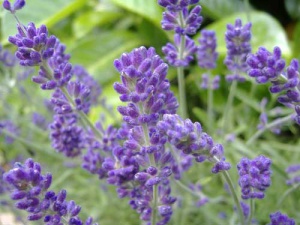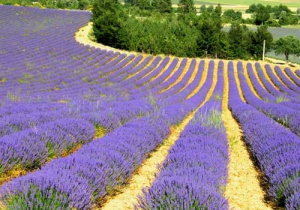Lavender
Contents
Popular Names
Other popular names for this herb are common, english, french, and garden Lavender. The name Lavender comes from the Latin root 'lavare', which means to wash, honoring it's value in purifying both body and spirit.
Description & Habitat
Lavender is a short heavily branched shrub with narrow grey/green colored leaves, whose flowers embrace a bluish hue. Although it is native to the mountainous zones of the Mediterranean, it flourishes throughout southern Europe, Australia and the United States. Lavender generally thrives in sunny and stony areas.
Constituents & Actions
The flowers of the Lavender herb are rich in volatile oils, coumarins and flavonoids. Effects are carminative (relieves intestinal gas pain and distension), anti-spasmotic (prevents or relieves spasms), anti-depressant, rubefacient (stimulates blood flow to the skin, causing local reddening), anti-fungal, emmenagogue (facilitates and regulates menstrual flow) and hypotensive (reduces blood pressue).
Medicinal Uses
This beautiful herb is valuable in treating stress related headaches, and can be used as a general tonic for the nervous system. Combined with rosemary, skullcap or kola, it is an effective remedy for depression. Lavender is also useful in external applications for insomnia and rheumatism. Externally, the oil can be inhaled, applied transdermally, or used in baths.
Lavender is a very popular herb used in aromatherapy. It has also been shown to benefit fungal skin infections such as candidiasis and eczema, when applied topically. Those suffering from hair loss due to autoimmune disease (alopecia areata), have experienced positive results from the topical use of this herb.
Women who suffer from menstrual pain and discomfort find relief when Lavender Oil vapors are inhaled. It also helps relieve symptoms of PMS (Pre-Menstrual Syndrome.
Infusion Preparation
For use as an internal infusion, pour one cup of boiling water onto a teaspoon of the dried herb, let infuse for 10 minutes, drink three times per day.
Available Forms
- aromatherapy oil
- bath gel
- extract
- infusion
- lotion
- soap
- sachet
- shampoo
- tincture
- whole, dried flowers
Side-Effects & Interactions
As with some particular herbs, Lavender may cause an allergic reaction in some people causing nausea, vomiting, headache or chills. Women who are pregnant or breast-feeding should consult with their doctor before using this herb. Lavender herb may intensify central nervous system depressive medications and make them stronger such as sedatives, morphine, oxycodone, valium, xanax, etc.

